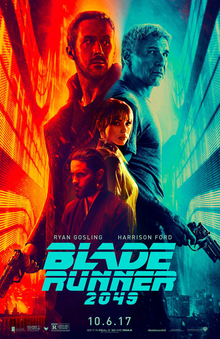
I was never a particularly ardent fan of the original film, probably because I had first watched it when I was too young to really appreciate its themes. I admired its esthetics but the idea of bioengineered humans being slaves wasn’t novel enough to impress me. So going to the cinema to watch this sequel is less about Blade Runner and more about having confidence in director Denis Villeneuve due to his fantastic work on Arrival.
Thirty years after the first film, replicant technology is back in use under industrialist Niander Wallace. K is one of these newer model replicants, assigned to work as a blade runner to hunt down rogue ones, mainly older models. During one such case, he finds a buried box containing human remains. It soon becomes evident that these are the bones of Rachael from the first film and that she died during childbirth. His superior is shocked at this finding and orders him to hunt down and kill this child. He travels to Wallace’s headquarters to find records of the old replicants and learns that Rachael probably had a romantic relationship with blade runner Rick Deckard. In the meantime, Wallace wants the child in order to be able to create replicants who can procreate. His goal seems to be to create an ever larger workforce of slave labor. K’s search leads him to an orphanage where he believes the child was sent. He becomes agitated that his memories seem to match what he sees at the orphanage yet he has always believed that the memories were artificially implanted and that he never had a childhood.
Both my wife and myself were apprehensive at the exceptionally long running time but the film is so engrossing and flows so smoothly that we needn’t have worried. In fact, I was surprised by how straightforward the narrative here is. The original after all featured dream sequences and unexplained quirks such as the mysterious origami figures which gave audiences plenty of fuel to debate about. This sequel deftly preserves some key ambiguities, most notably by refusing to definitively answer whether Deckard was a replicant after all and leaving clues that support both arguments. But apart from those, there is no attempt at obfuscation. Villeneuve very clearly wants audiences to understand what is going on at all times, up to and including the double twist. I’m sort of torn over this change. This plain-spokenness helps comprehension, sure, but I think it also does away with some of the poetic beauty of the original.
The visuals are as gorgeous as everyone expects and the measured pace of the film gives you plenty of time to salivate over them. The soundscape is less impressive as I’m getting a bit bored that only Hans Zimmer gets to conduct the scores for all films of this type. I especially loved its depiction of a lived, used world of the future, K’s apartment, the random traffic on the street, K having a quick bite on a stool and so on. All those details of everyday life are laid out casually but it must taken a great deal of thought and imagination to work them all out. Unfortunately while the main plot offers a decent sense of intrigue and the twists are well done, the idea of the bioengineered humans being subhuman slaves is too familiar by now to have much science-fiction value. By the time it gets to hinting about an imminent replicant uprising, it starts feeling like a very standard action formula reminiscent of many other movie franchises. Jared Leto tries hard to be mysteriously menacing but his motivations ultimately don’t make much sense. It’s hard to be admiring of the same basic setup when a television series as good as Westworld already exists.
By contrast the subplot about K’s virtual girlfriend Joi was far more interesting to me. I was so worried when they introduced the character of the prostitute Mariette that they would make K realize how artificial Joi is compared to her and I was very pleased that Villeneueve didn’t take this easy route. Besides the question of how real Joi is as a person or whether her behavior was purely programmed with no room for individuality, I enjoyed pondering whether or not the distinction matters at all when K clearly derives great satisfaction from his interactions with her. This perhaps is the true unifying theme of this film. When K asks Deckard whether or not his dog is real, his response suggests that it shouldn’t really matter. I found this to be a natural continuation of the same type of exploration that we saw in Her and it’s solid science-fiction.
Simply by virtue of being a sequel, Blade Runner 2049 was never likely going to end up being a classic like the first film. It could never be as original and needs to operate within previously established constraints. I’d even argue that it lacks some of the poetic power of its predecessor in exchange for a more sophisticated plot. Still, this is a beautiful piece and great work by Villeneuve. Arrival remains the best science-fiction film of the year but it’s rather incredible that the same director is responsible for the second best one.